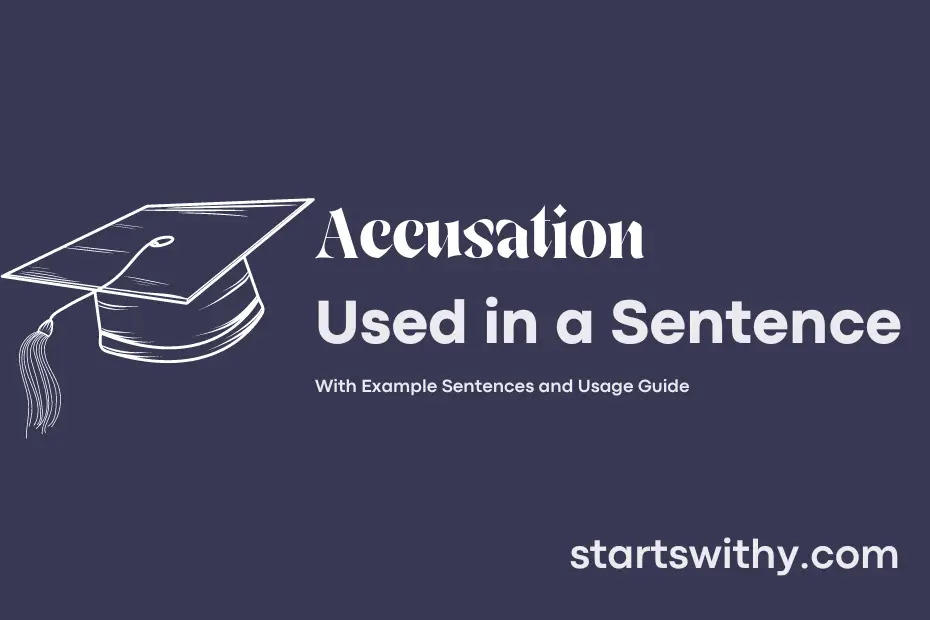Have you ever been falsely accused of something you didn’t do? An accusation is a statement or claim that someone has done something wrong or illegal, often made without proof or evidence to support it.
Accusations can have serious consequences, impacting relationships, reputation, and even legal implications. It is important to handle accusations calmly and seek resolution through communication and evidence-based reasoning.
7 Examples Of Accusation Used In a Sentence For Kids
- Accusation means blaming someone for something.
- It is not nice to make an accusation without evidence.
- If you have a problem, talk about it instead of making an accusation.
- Remember to be kind and gentle when discussing an accusation.
- Always listen to both sides of an accusation before making a judgment.
- Don’t be afraid to ask for help if you are facing an accusation.
- It’s important to handle an accusation calmly and peacefully.
14 Sentences with Accusation Examples
- Accusation of cheating during exams can result in serious consequences in college.
- Submitting someone else’s work as your own can lead to plagiarism accusations.
- Being tardy to class may lead to an accusation of irresponsibility from your professors.
- Failing to cite sources properly in your research paper can lead to accusations of academic dishonesty.
- Skipping group meetings can result in accusations of not pulling your weight in the project.
- Not following the dress code for a presentation can lead to accusations of unprofessionalism.
- Missing deadlines frequently can result in accusations of poor time management skills.
- Engaging in disruptive behavior in class can lead to accusations of lack of respect for your peers and professors.
- Getting involved in fights or conflicts on campus may result in accusations of violence or misconduct.
- Sharing exam answers with others can lead to accusations of cheating and academic misconduct.
- Being found with alcohol or drugs on campus can lead to accusations of violating college policies.
- Failing to attend mandatory workshops or seminars can result in accusations of not being committed to your academic growth.
- Not participating in group discussions or activities can lead to accusations of not being a team player.
- Posting inappropriate or offensive content on social media can lead to accusations of harming the college’s reputation.
How To Use Accusation in Sentences?
Accusation is a noun that refers to a charge or claim that someone has done something wrong or illegal.
When using Accusation in a sentence, it is important to remember a few key points. Firstly, the word should be used to describe a formal statement against someone, not just a general assumption or suspicion. For example, “The police made an accusation that the suspect had stolen the car.”
Secondly, Accusation should be followed by the preposition “of” or “that” depending on the context of the sentence. For instance, “There was an accusation of fraud against the company” or “She denied the accusation that she was lying.”
It is also crucial to provide context or evidence to support the Accusation in order to make it credible. For instance, “The accusation of plagiarism was backed up by multiple sources.”
Lastly, when using Accusation in a sentence, it is important to be respectful and considerate, as Accusations can have serious consequences. Instead of making baseless Accusations, it is always best to gather evidence and present it in a clear and concise manner.
By following these guidelines, beginners can effectively use Accusation in a sentence with confidence and accuracy.
Conclusion
In conclusion, sentences containing accusations are statements that attribute fault or blame to someone or something. They typically assert wrongdoing or misconduct and can have serious implications. Accusatory sentences are used to confront, challenge, or criticize, making the accused party accountable for their actions or decisions. It is important to consider the impact of such sentences, as they can tarnish reputations, damage relationships, and lead to legal consequences if proven false.
Accusatory sentences should be communicated with care, based on evidence and facts rather than assumptions or biases. The use of clear and precise language is crucial in accurately conveying accusations without causing undue harm or misunderstanding. Ultimately, when crafting accusatory statements, it’s vital to strike a balance between asserting accountability and preserving fairness and justice.



